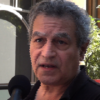From Connsortium News
With U.S.-Russia tensions as dangerously high as they've been since the worst days of the Cold War, there is potential new evidence that Russia was not behind a hack of the Democratic National Committee, although Congress and the U.S. mainstream media accept the unproven allegation of Russia's guilt as indisputable fact.
The possible new evidence comes in the form of a leaked audiotape of veteran investigative journalist Seymour Hersh in which Hersh is heard to say that not Russia, but a DNC insider, was the source of the Democratic emails published by WikiLeaks just before the start of the Democratic National Convention in late July 2016.
Hersh said on the tape that the source of the leak was former DNC employee Seth Rich, who was murdered on a darkened street in a rough neighborhood of Northwest Washington D.C. two weeks before the Convention, on July 10, 2016. But Hersh threw cold water on a theory that the murder was an assassination in retaliation for the leak. Instead, Hersh concurs with the D.C. police who say the murder was a botched robbery.
Mainstream news outlets have mocked any linkage between Rich's murder and the disclosure of the DNC emails as a "conspiracy theory," but Hersh's comments suggest another possibility -- that the murder and the leak were unrelated while Rich may still have been the leaker.
In dismissing the possibility that Rich was the leaker, mainstream media outlets often ignore one of the key reasons why some people believe that he was: Shortly after his murder, WikiLeaks, which has denied receiving the emails from the Russian government, posted a Tweet offering a $20,000 reward for information leading to the solution of the mystery of who killed Rich.
Julian Assange, WikiLeaks founder and publisher, brought up Rich's murder out of context in an interview with Dutch TV last August. "Whistle-blowers go to significant efforts to get us material and often very significant risks," Assange said. "As a 27-year-old, works for the DNC, was shot in the back, murdered just a few weeks ago for unknown reasons as he was walking down the street in Washington."
Pressed by the interviewer to say whether Rich was the source of the DNC emails, Assange said WikiLeaks never reveals its sources. Yet, it appeared to be an indirect way of naming Rich, while formally maintaining WikiLeak's policy. An alternative view would be to believe that Assange is cynically using Rich's death to divert the trail from the real source.
But Assange is likely one of the few people who actually knows who the source is, so his professed interest in Rich's murder presents a clue regarding the source of the leak that any responsible news organization would at least acknowledge although that has not been the case in many recent mainstream articles about the supposed Seth Rich "conspiracy theory."
Hersh's Unwitting Tapes
Hersh's taped comments add another element to the mystery, given his long record of shedding light into the dark corners of the U.S. government's crimes, lies and cover-ups. He exposed the My Lai massacre during the Vietnam War; revealed illegal CIA spying in the 1970s spurring wide-ranging Congressional investigations and reform; and uncovered U.S. torture in Abu Ghraib prison in Iraq.
In the audiotape -- which Hersh told me was made without his permission -- he quoted an unnamed government source who told him that Rich offered the DNC emails to WikiLeaks in exchange for money.
"What I know comes off an FBI report. Don't ask me how. You can figure it out, I've been around a long time," Hersh says on the tape. "I have somebody on the inside who will go and read a file for me. This person is unbelievably accurate and careful, he's a very high-level guy and he'll do a favor. You're just going to have to trust me."
The FBI cyber unit got involved after the D.C. police were unable to access protected files on Rich's computer, Hersh said. So the FBI "found what he'd done. He had submitted a series of documents, of emails. Some juicy emails from the DNC," to Wikileaks, Hersh said.
(Note: You can view every article as one long page if you sign up as an Advocate Member, or higher).







